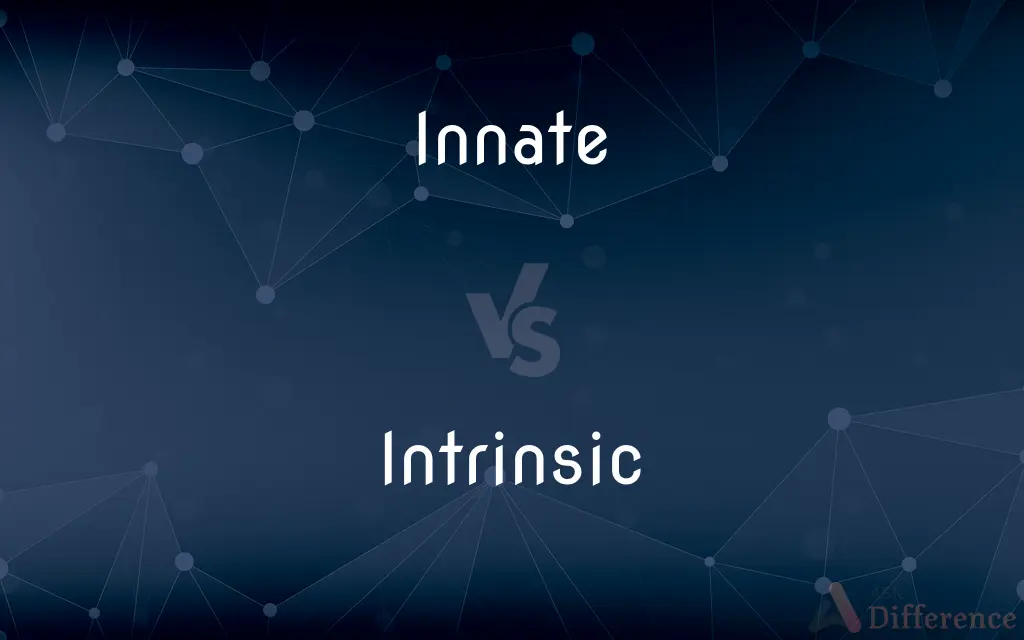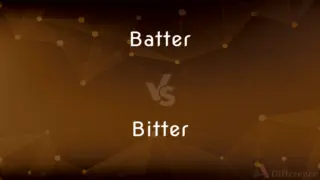Innate vs. Intrinsic — What's the Difference?
By Urooj Arif & Fiza Rafique — Updated on April 7, 2024
Innate refers to qualities or abilities present from birth, inherent to one's nature, while intrinsic denotes qualities that are essential or inherent to the subject itself, not dependent on external factors.

Difference Between Innate and Intrinsic
Table of Contents
ADVERTISEMENT
Key Differences
Innate qualities or abilities are those an individual is born with, such as innate talent for music or an innate immune response. These characteristics are not learned or acquired through experience but are a fundamental part of one’s biological or psychological makeup from the outset. Intrinsic qualities, on the other hand, are inherent to the subject itself, regardless of whether they are present from birth or develop over time. Intrinsic motivation, for example, arises from within an individual as a result of personal interest or enjoyment in the task itself, rather than external rewards.
While innate attributes are always intrinsic to the individual, not all intrinsic qualities are innate. For example, an innate ability for language acquisition is a trait humans are born with, deeply embedded in our genetic makeup. This is both innate and intrinsic as it is an essential part of being human. However, an individual’s intrinsic value or an intrinsic quality of a diamond, such as its brilliance, is inherent and essential to what it is, but not necessarily present from birth or naturally occurring in the case of synthetic diamonds.
The concept of innateness often applies to biological or hereditary traits, emphasizing the role of genetics and pre-existing conditions in shaping who we are. This includes not only physical characteristics like eye color but also predispositions to certain behaviors or abilities. Conversely, intrinsic qualities can apply to both living beings and inanimate objects, focusing on the essential nature or inherent characteristics of whatever is being considered, without implying a biological origin.
Understanding the distinction between innate and intrinsic is crucial in fields such as psychology, education, and ethics. For psychologists, distinguishing between innate behaviors and those that are intrinsically motivated but acquired can inform approaches to learning and development. In education, recognizing a student's innate abilities as well as their intrinsic interests helps tailor teaching methods to support both natural talents and developed passions.
In terms of personal development and self-awareness, appreciating the innate aspects of oneself—those qualities and abilities one is born with—can lead to a deeper understanding of one’s potential and limitations. Similarly, recognizing what is intrinsic to oneself or to objects of interest can foster a greater appreciation for their true nature and value, independent of external influences or conditions.
ADVERTISEMENT
Comparison Chart
Definition
Present from birth, inherent to one's nature.
Essential or inherent to the subject itself.
Application
Primarily to biological or hereditary traits.
To both living beings and inanimate objects.
Origin
Biological or genetic.
Can be biological or developed, depending on the context.
Examples
Innate immune system, innate musical talent.
Intrinsic motivation, intrinsic value of a diamond.
Relation to Birth
Always present from birth.
Not necessarily present from birth or related to biology.
Compare with Definitions
Innate
Present from birth.
Humans have an innate ability to recognize faces.
Intrinsic
Essential or inherent nature.
The intrinsic value of honesty is recognized universally.
Innate
Not acquired by learning.
Birds have an innate instinct to migrate.
Intrinsic
Originating from within.
Her intrinsic motivation led to personal growth.
Innate
Biological or hereditary in nature.
Innate immune responses are the body's first line of defense.
Intrinsic
Not dependent on external factors.
Diamonds are prized for their intrinsic qualities.
Innate
Unchanging and inherent.
The innate fear of darkness is common in many species.
Intrinsic
Central to the essence or nature.
Creativity is intrinsic to artistic expression.
Innate
Fundamental to one's nature.
His innate sense of rhythm made him a great dancer.
Intrinsic
Reflecting an inherent merit.
The painting's intrinsic beauty captivated everyone.
Innate
Existing naturally or by heredity rather than being learned through experience
"Chimpanzees show an innate distrust of contact with strangers" (Cindy Engel).
Intrinsic
Of or relating to the essential nature of a thing; inherent.
Innate
Of or produced by the mind rather than learned through experience
An innate knowledge of right and wrong.
Intrinsic
(Anatomy) Situated within or belonging solely to the organ or body part on which it acts. Used of certain nerves and muscles.
Innate
Possessed as an essential characteristic; inherent
"As the Army and farmers built more and more levees, the Missouri lost an innate capacity to absorb its frequent excesses" (William Least Heat-Moon).
Intrinsic
Innate, inherent, inseparable from the thing itself, essential.
The intrinsic value of gold or silver
The intrinsic merit of an action
Innate
Inborn; existing or having existed since birth.
Intrinsic
Situated, produced, secreted in, or coming from inside an organ, tissue, muscle or member.
Innate
(philosophy) Originating in, or derived from, the constitution of the intellect, as opposed to acquired from experience.
Innate ideas
Intrinsic
Built-in.
Innate
Instinctive; coming from instinct.
Intrinsic
A built-in function that is implemented directly by the compiler, without any intermediate call to a library.
SIMD intrinics
Innate
(botany) Joined by the base to the very tip of a filament.
An innate anther
Intrinsic
(video games) An ability possessed by a character and not requiring any external equipment.
You can acquire the fire-resistance intrinsic''' by eating dragon meat.
Innate
(obsolete) To cause to exist; to call into being.
Intrinsic
Inward; internal; hence, true; genuine; real; essential; inherent; not merely apparent or accidental; - opposed to extrinsic; as, the intrinsic value of gold or silver; the intrinsic merit of an action; the intrinsic worth or goodness of a person.
He was better qualified than they to estimate justly the intrinsic value of Grecian philosophy and refinement.
Innate
Inborn; native; natural; as, innate vigor; innate eloquence.
Intrinsic
Included wholly within an organ or limb, as certain groups of muscles; - opposed to extrinsic.
Innate
Originating in, or derived from, the constitution of the intellect, as opposed to acquired from experience; as, innate ideas. See A priori, Intuitive.
There is an innate light in every man, discovering to him the first lines of duty in the common notions of good and evil.
Men would not be guilty if they did not carry in their mind common notions of morality, innate and written in divine letters.
If I could only show, as I hope I shall . . . how men, barely by the use of their natural faculties, may attain to all the knowledge they have, without the help of any innate impressions; and may arrive at certainty without any such original notions or principles.
Intrinsic
A genuine quality.
Innate
Joined by the base to the very tip of a filament; as, an innate anther.
Intrinsic
Belonging to a thing by its very nature;
Form was treated as something intrinsic, as the very essence of the thing
Innate
To cause to exit; to call into being.
Intrinsic
Situated within or belonging solely to the organ or body part on which it acts;
Intrinsic muscles
Innate
Not established by conditioning or learning;
An unconditioned reflex
Innate
Being talented through inherited qualities;
A natural leader
A born musician
An innate talent
Innate
Present at birth but not necessarily hereditary; acquired during fetal development
Common Curiosities
What is innate?
Innate refers to qualities, abilities, or characteristics that one possesses from birth, highlighting aspects that are inherent and unacquired.
Why is understanding the difference between innate and intrinsic important?
Recognizing the distinction can inform approaches in psychology, education, ethics, and personal development by understanding the origin and essence of characteristics or values.
What does intrinsic mean?
Intrinsic denotes qualities that are essential and inherent to the subject itself, originating from within, regardless of external influences.
How do educators use knowledge of innate and intrinsic qualities?
Educators can tailor learning experiences to align with students' innate abilities and intrinsic interests, promoting engagement and effective learning.
Do innate abilities limit a person's potential?
While innate abilities can set certain predispositions, personal growth and potential are also influenced by external experiences, learning, and effort.
Can the intrinsic value of an object change?
The intrinsic value of an object can change in perception depending on cultural, historical, and personal factors, even though its inherent qualities remain constant.
Are all innate qualities immediately evident at birth?
Not all innate qualities are evident at birth; some, like certain talents or predispositions, may emerge or become apparent over time.
How does society impact the expression of innate and intrinsic qualities?
Society and culture can influence the expression and valuation of innate and intrinsic qualities through norms, expectations, and opportunities for development.
What is the relationship between intrinsic motivation and happiness?
Intrinsic motivation, being driven by personal interest and internal rewards, is closely linked to higher satisfaction and happiness.
Can a quality be both innate and intrinsic?
Yes, qualities such as innate abilities are both inherent from birth (innate) and essential to the individual’s nature (intrinsic).
How do innate and intrinsic differ in application?
Innate qualities are typically related to biological or genetic traits, while intrinsic qualities can apply to a broader range of subjects, including inanimate objects and developed attributes.
How do innate and intrinsic factors contribute to motivation?
Innate factors can predispose individuals towards certain motivations, while intrinsic factors drive behavior based on internal satisfaction and personal values.
How do innate and intrinsic qualities interact in shaping behavior?
Innate qualities provide a foundation, while intrinsic qualities, whether developed or inherent, drive behavior based on personal values and internal rewards.
How can understanding intrinsic qualities benefit personal relationships?
Understanding the intrinsic qualities of individuals can lead to deeper appreciation and respect, enhancing the quality of personal relationships.
Can environmental factors influence innate qualities?
While environmental factors can't change innate qualities, they can affect their expression and development, highlighting the interaction between nature and nurture.
What challenges arise in distinguishing between innate and intrinsic qualities?
Distinguishing between the two can be challenging due to their overlap and the complex interplay between genetics, environment, and personal development.
Share Your Discovery

Previous Comparison
Batter vs. Bitter
Next Comparison
Unwind vs. WindAuthor Spotlight
Written by
Urooj ArifUrooj is a skilled content writer at Ask Difference, known for her exceptional ability to simplify complex topics into engaging and informative content. With a passion for research and a flair for clear, concise writing, she consistently delivers articles that resonate with our diverse audience.
Co-written by
Fiza RafiqueFiza Rafique is a skilled content writer at AskDifference.com, where she meticulously refines and enhances written pieces. Drawing from her vast editorial expertise, Fiza ensures clarity, accuracy, and precision in every article. Passionate about language, she continually seeks to elevate the quality of content for readers worldwide.














































